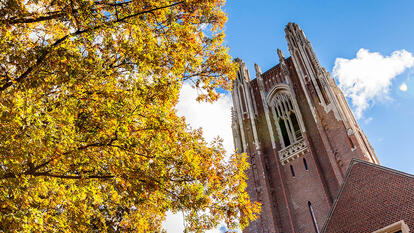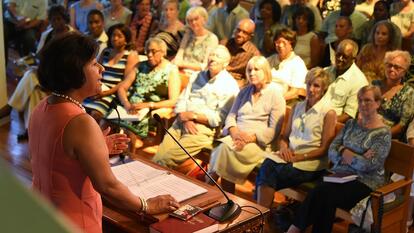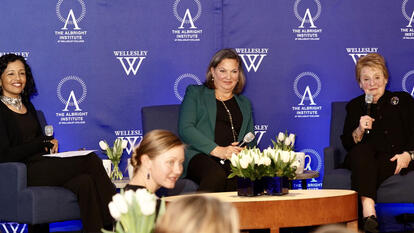Our Focus on Changes to U.S. Immigration Policy Continues: “Building Connections Between Campus and Community”

The campus community is invited to attend a discussion this afternoon, April 18, with organizers from the MetroWest area to explore initiatives—and possible Wellesley partnerships—in support of local communities. The event, “Wellesley in MetroWest: Building Connections Between Campus and Community,” is part of a series of workshops, community discussions, and town halls focused on the recent changes to U.S. immigration policy.
Today’s discussion will include representatives from MetroWest Worker Center/Casa de Trabajadores, MetroWest Health Foundation, Latino Health Insurance Program, OUT MetroWest, Massachusetts Committing Institution-Framingham, and Framingham Public Schools. The event will be held in the Alumnae Hall Ballroom at 4:15 pm.
On Tuesday, April 25, “Cross Movement Solidarity: A Workshop” will feature Shannon Al-Wakeel of the Muslim Justice League. In this workshop, Wellesley College community members will learn about concrete ways to support and build solidarity with and among diverse communities affected by both the recent executive orders on immigration and refugees and the ongoing “countering violent extremism” (CVE) programs in Greater Boston. The event will take place at Harambee House at 4:30 pm.
These and previous events have been organized by the College’s Working Group on the Effects of Immigration Policy on the Wellesley Community. Students have told members of the working group that they want to be informed, and there is “also a desire to understand what they can do, how they can connect with others on these issues,” said Soo Hong, associate professor of education and chair of the working group. Some students, said Hong, “tell me that not a day or moment goes by when they are free of worry or concern, for themselves or those they hold dear.” Many on campus have told the working group they want this to be “a moment to support each other and see the ways they can work together to achieve a sense of humanity that they commonly hold to be true.”
The working group hopes to allay the community’s anxieties about not knowing what the future holds. “There is a sense that some in our community and beyond are vulnerable and exposed in ways that feel unjust and unwarranted,” said Hong. “There is also a sense that it’s important for us to talk about this as a community” to ensure misrepresentation and misunderstanding are avoided.
Previous events in the series have included a workshop with Aliya Khalidi ’07 on community members’ rights under the Trump administration’s recent executive orders, a student-led conversation with the Multifaith Council on the impact of the new executive orders on religious minorities, and a town hall meeting with a leading immigration attorney on navigating the policies of the new executive orders. In that event, a local immigration attorney, Prasant Desai, of Iandoli, Desai, & Cronin, P.C. spoke to the audience on the history of immigration law and outlined the changes and related implications since the first immigration executive order.
The series is organized in collaboration with the working group, Slater International Center, the Office of Religious and Spiritual Life, with support from the Office of the President. The Project for Public Leadership and Action organized “Wellesley in MetroWest: Building Connections Between Campus and Community.”
President Paula Johnson convened the working group to monitor and analyze the impact of the executive orders and other immigration policy changes and to share information with Wellesley students, scholars, faculty, and staff. According to Hong, “[S]ince its inception, the working group has strived to develop connections and initiate conversations with affected community members and groups to ensure that its goals are rooted in community needs and experiences.”
Christine Roberts ’17 contributed to this story.



